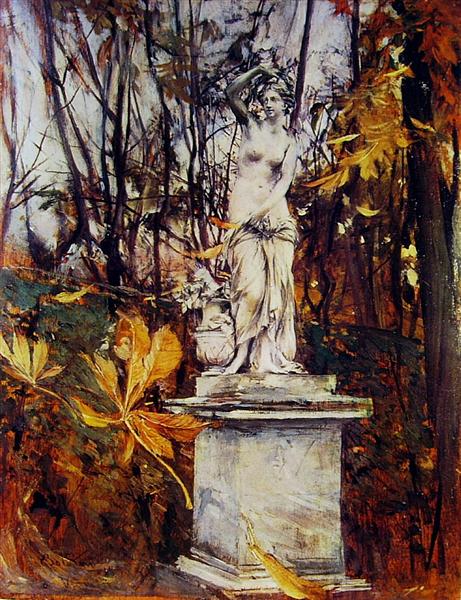
________
has flown towards the site of her
commissioned mischief, to hex
Aglauros, who’s miffed her
When Athens she beheld, for arts renown’d,
With peace made happy, and with plenty crown’d,
Athens, its glories, architectural,
literary, political, philosophical, would
have been impressive still, despite its
intervening decline, to the mind of a
Roman poet of the later First Century,
compare, say, a contemporary poet’s
evaluation of Great Britain’s grandeur
during its 19th Century supremacy, or
of the United States’ promise before
its late-20th-Century deterioration
Scarce could the hideous fiend from tears forbear,
To find out nothing that deserv’d a tear.
Envy, the hideous fiend, was upset
because she couldn’t find anything
to cry about, anything that deserv’d
a tear
Th’ apartment now she enter’d, where at rest
Aglauros lay, with gentle sleep opprest.
with gentle sleep opprest seems
to me oxymoronic, conflicting
definitions, how could a gentle
sleep oppress, but let’s continue
To execute Minerva’s dire command,
She stroak’d the virgin with her canker’d hand,
Then prickly thorns into her breast convey’d,
That stung to madness the devoted maid:
Her subtle venom still improves the smart,
improves the smart, accentuates
the sudden pain
Frets in the blood, and festers in the heart.
Frets in, unsettles, the blood, festers,
rots , becomes cankerous, in the heart.
To make the work more sure, a scene she drew,
And plac’d before the dreaming virgin’s view
Her sister’s marriage, and her glorious fate:
Th’ imaginary bride appears in state;
The bride-groom with unwonted beauty glows:
For envy magnifies what-e’er she shows.
Aglauros is not only struck with
subtle venom, but subjected to
psychological manipulation, if
you’ll excuse the reference to
modern analytical methods, is
made to see [h]er sister’s
marriage, Herse‘s, as well as
her glorious fate
For envy magnifies what-e’er
she shows, an observation
worth remembering
Full of the dream, Aglauros pin’d away
In tears all night, in darkness all the day;
the dream, though Envy might’ve
envenomed Aglauros in her sleep,
the unwanted vision continues to
plague her throughout the following
days, and nights
Consum’d like ice, that just begins to run,
When feebly smitten by the distant sun;
Or like unwholsome weeds, that set on fire
Are slowly wasted, and in smoke expire.
the slow torture in the mind of
rancour there eating away at
the psyche
Giv’n up to envy (for in ev’ry thought
The thorns, the venom, and the vision wrought)
The thorns, the venom, and the vision,
all three, wrought, writhing, smouldering,
in ev’ry thought
Oft did she call on death, as oft decreed,
decreed, resolved
Rather than see her sister’s wish succeed,
To tell her awfull father what had past:
her awfull father, Cecrops l, founder
and first king of Athens, according to
myth
awfull, as in inspiring awe, reverence
At length before the door her self she cast;
the door, of her chamber, where the
Aglauros to speak in his favour to
her sister, Herse, whom he had
cast, set herself up awaiting the
God’s return
And, sitting on the ground with sullen pride,
A passage to the love-sick God deny’d.
she will not praise him to her sister
The God caress’d, and for admission pray’d,
And sooth’d in softest words th’ envenom’d maid.
caress’d, used endearing words
In vain he sooth’d: “Begone!” the maid replies,
“Or here I keep my seat, and never rise.”
I’ll stay here till you leave, Aglauros
“Then keep thy seat for ever,” cries the God,
the impudence of vying with a god
has its consequences
And touch’d the door, wide op’ning to his rod.
his rod, his caduceus, his winged
staff
Fain would she rise, and stop him,
Fain,willingly
but she found
Her trunk too heavy to forsake the ground;
Her joynts are all benum’d, her hands are pale,
And marble now appears in ev’ry nail.
As when a cancer in the body feeds,
And gradual death from limb to limb proceeds;
So does the chilness to each vital parte
Spread by degrees, and creeps into her heart;
‘Till hard’ning ev’ry where, and speechless grown,
She sits unmov’d, and freezes to a stone.
Aglauros has become of stone,
a statue
But still her envious hue and sullen mien
Are in the sedentary figure seen.
still, though Aglauros might’ve been
rendered inanimate, it’s interesting
to note that she’s nevertheless
become immortal, immortalized
R ! chard





